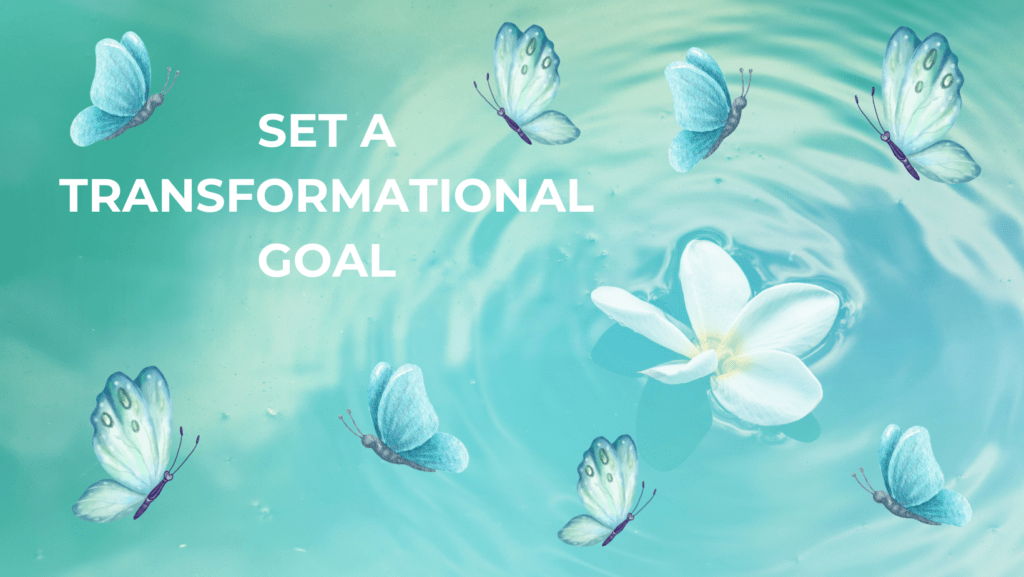
SET A TRANSFORMATIONAL GOAL
“You’re transforming old patterns of your mind and letting go of thoughts you don’t need to have around any longer.” Anonymous
The second step in your transformational journey is to set a transformational goal. You’ve already identified your problem and declared you have a desire for change. So now, what do you want your life to look and feel like? What are your deepest desires, dreams, and higher aspirations?
See if any of these ring true to you. They are clearly defined. Can you picture what it would look and feel like to have achieved any of them? (The unclear, vague goals are listed in parentheses.)
- I want to have compassion and empathy for myself and others, especially those with whom I have had problematic relationships or encounters. (I want to be a nicer person.)
- I want to express myself authentically and have the courage to set boundaries and live a purposeful life. (I want to speak my truth.)
- I want to embody myself fully by experiencing, breathing, and being grounded so I can live a life of abundance. (I want to get out of my head.)
Setting this type of goal differs from SMART goals in a couple of ways. First, it may or may not be specific; second, it may or may not be time-bound. There are, however, four factors that go into transformational goal setting. They are:
- The nature of a healthy goal
- Involving the right people
- The right size and scope of the goal
- The importance of intention
The Nature of a Healthy Goal
“Set a goal so meaningful that it creates a drive inside of you. A drive to become better and stronger.”

There are several factors of healthy transformational goals.
- They are meaningful. A meaningful goal makes you more authentic and effective, helping you transform into a better person. You look to find a reason beyond yourself to impact everything in your outer world. They are emotional and inspire your inner drive and a sense of purpose.
- They are precisely expressed. Vague goals produce vague results. When you have a plan such as “I want to be a better person,” it not precise. Better than what? Or “I want to improve my writing.” Improve what, editing, content, grammar, etc.? All goals need to be clear, concise, and action-oriented and be expressed so that there is little doubt about the specific outcome that is being sought.
- They are compelling. Compelling goals help us find ways of meeting them. Who do you want to be once you’ve achieved it? They evoke the excitement of being on a glorious journey.
- They result in a more spacious way of being. You can see a bigger picture with a more expansive perspective and variables with these goals, and you have a more comprehensive view to consider.
Involving the Right People
When supported by others, transformation occurs more dynamically. There’s accountability and sharing your goals with the right people to see if they are right for you. Paradigms can be invisible, and you may have blind spots, so including others can furnish extra awareness.
Additionally, others most likely already know your behavior patterns and can provide feedback on how you are progressing. The input is invaluable information for your transformation.
The Right Size of a Transformational Goal
A transformational goal that is too large may cause you to become overwhelmed and not even start the process. If it’s too little, it’s most likely not a transformation, and transformation is a process that takes time, usually 6 to 9 months.
Examples of a Transformational Goal
The following are examples of transformational goals:
- I want to trust myself and others by being vulnerable, feeling safe and secure, and focusing on positivity.
- I want the ability to set strong boundaries and not allow people to take advantage of my good-hearted nature.
- Learning to be successful while making mistakes instead of striving for perfection is what I yearn for.
- I want to have compassion for others and myself, knowing I am becoming the best version of myself—one who stands tall and has self-esteem.
The Importance of Intention
You may have heard of The Power of Intention by Dr. Wayne Dyer. Using the power of intention 
Setting a transformational goal is like creating a beacon of light where you focus when the work gets challenging, and it is what keeps you going. The right one will be strong enough to pick you up when the times get tough. And they may.

Connect with me on Facebook and LinkedIn for more wisdom.

